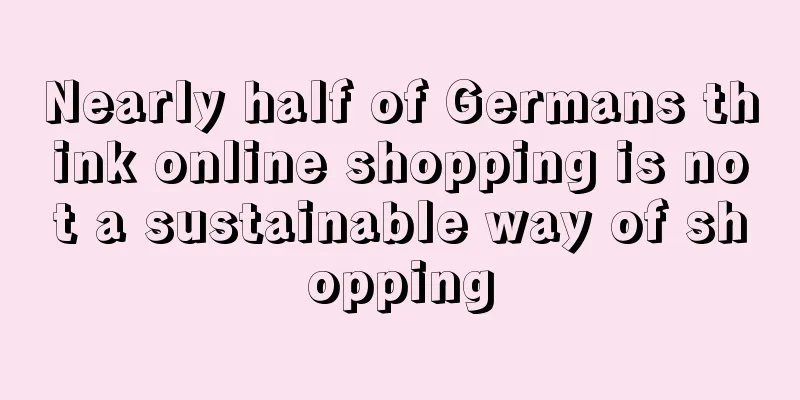Nearly half of Germans think online shopping is not a sustainable way of shopping

|
In the common sense of many Germans, shopping in offline stores is more sustainable than shopping online. About half of Germans ( 46%) even think that e-commerce is not a sustainable way of shopping. However, the opposite is true. According to a survey by market research organization YouGov , online shopping is more in line with the concept of sustainable development.
The survey found that when comparing online shopping and shopping in physical stores , 44% of Germans believe that offline shopping is more sustainable, while only 18% believe that online shopping is more sustainable . In addition, 32% of respondents believe that there is no difference between the two shopping methods, and 11% of Germans have no opinion on this.
The survey also pointed out that when people were asked separately whether e-commerce is a sustainable way of purchasing , 46% of respondents denied it, 28% clearly stated that e-commerce is indeed a sustainable way of purchasing , and about a quarter ( 26%) of respondents had no opinion on this.
Based on this, market research organization YouGov believes that the public perception of " e-commerce is more sustainable " is worse than the survey results show, and people's awareness of e-commerce needs to be further improved. As for why online shopping is more sustainable than offline shopping, consulting firm Oliver Wyman explained: when people shop in offline physical stores, they emit more pollutants due to transportation problems.
Since online shopping is more environmentally friendly, how can we further improve the sustainability of e-commerce ? In this regard, 64% of German consumers believe that buying multiple products at one time can reduce waste and is more in line with sustainability requirements.
In addition, some consumers believe that the return problem is the main obstacle to the development of sustainable e-commerce. To avoid this, many consumers hope that merchants can provide more detailed information about the product ( 49% ) , product images ( 39%) and product videos (29% ).
Nowadays, sustainability has gradually become a trend, and more and more Europeans pay attention to sustainability when shopping. Therefore, merchants can focus more on sustainability to win the hearts of consumers. Germany E-commerce Sustainable |
Recommend
Second-hand clothing orders surge, Mädchenflohmarkt sales soar 50%
During the epidemic, more and more second-hand me...
What is Dianba-Shopee? Dianba-Shopee Review, Features
Dianba-Shopee is a data analysis software speciall...
What is Ro? Ro Review, Features
Founded in October 2017, Ro is a healthcare techn...
September is the start of the school year in Europe and the United States. Cainiao International Express has 11 all-cargo planes flying directly to Europe every week.
The “strongest” back-to-school season is here. As...
Flipkart Quick hyperlocal delivery service expands to six new cities
Earlier, Indian e-commerce retailer Flipkart laun...
Cainiao wins the Stevie Award, the highest honor in American business, for transporting 250 million pieces of relief supplies worldwide
The Stevie Awards are business awards established...
Amazon upgrades its “refund only” policy, and sellers are furious!
As one of the giants in the global e-commerce mar...
What is JEAWIN (Xiamen Jieying Network Technology Co., Ltd.)? JEAWIN (Xiamen Jieying Network Technology Co., Ltd.) Review, Features
JEAWIN is a service-oriented innovative Internet ...
Excellent! Yiwu seller has only been in the business for one year, but has over 4,000 orders per day...
The cross-border circle is a place where hidden d...
What is JazzCash? JazzCash Review, Features
JazzCash is a well-known payment platform in Paki...
XTransfer released its first export PMI. In April, the export of goods of Guangdong's small and medium-sized enterprises (B2B) showed an expansion trend.
Recently, XTransfer, a one-stop cross-border fina...
Fast fashion faces sharp decline in next decade or less, UBS warns
Analysts say fast-fashion retailers could face re...
The number of sellers has reached 10 million. What is the magic of Etsy in the United States?
The COVID-19 pandemic has brought huge business o...
SGS Online Store launches new function "Easy Purchase, Easy Quote"
According to an official announcement from SGS , ...
The leading brand of gaming chairs received nearly 100 million yuan in Series A financing!
Recently, Wudi Industrial (Shanghai) Co., Ltd. (h...









